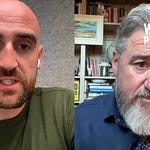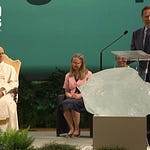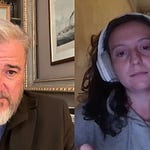Not since the Cuban Missile Crisis has a UN forum seen a debate as dramatic for the future of the species. Today the International Court of Justice in The Hague (aka “the World Court”) began two weeks of hearings to produce an advisory opinion about what if any obligations national governments have to protect against the harms caused by climate change, and what if they fail to meet those obligations.
And it comes after a 0-3 record so far this year:
yesterday in South Korea, UN negotiations collapsed after they failed to produce a treaty to reduce the use of plastics
Legal eagle friends-of-the-show Loes van Dijk and Dana Drugmand have previewed this case in previous episodes. 1
Short version: the small island state of Vanuatu, inspired by a group of law students, backed by a coalition of other small island states like Fiji, Tuvalu, Kirabati, and more, won endorsement from the UN General Assembly to ask the Court for an opinion about whether big historical emitting countries that caused climate change are in breach of existing international law.
First it sounds trivial but consider the theatre. Like 1962, what happens in the room won’t be the main determinant of the outcome of whether the world avoids disaster. But it also was an historic moment that made the stakes legible, and at a human scale, and itself providing evidence of the point that jaw jaw is better than war war.
As opening oral testimony dramatically showed, for those people who in some cases have already been forced to permanently leave their home due to climate change, with more coming, the stakes for them are existential. And none of the people affected first are responsible for the damage.
So, couple things. The episode attached is basically excerpts from the opening testimony. Speaking first was Vanuatu’s Ralph Regenvanu, and the small island’s attorney general.
Other witnesses included
Julian Aguon, the Guam-based lawyer with Blue Ocean Law who recounted the litany of communities across the Pacific that have already fallen victim to rising seas due to climate change, forced to permanently relocate, and losing their basic right to exist under international law. Aguon also made the connection between the ICJ’s earlier ruling on Gaza, which we imagine will get some responses. [We fool ourselves talking about this in terms of future harms. With all sympathy for Tenbury Wells in northern England2, Fiji has a chilling “Standard Operating Procedure” plan for phased retreat from vulnerable areas from the whole country. It is already being implemented.]
Professor Margarita Wewerenke-Singh of the University of Amsterdam, who made an extremely cogent case of how existing law has led to key precedents we’ve covered on this show, and how those precedents relate to today’s set of hearings: the Swiss Klimasenniorren case at the European Court of Human Rights as well as other cases, and even a mention for Vermont’s ‘make polluters pay’ climate Superfund law.
And Cynthia Houniuhi, president of Pacific Island Students Fighting Climate Change, that Hollywood-ready plucky group of law students who did the work making the case possible.
We’re going to include a lot of what they said in the video/audio above and in our feeds. But here’s a sample of the arguments:
Key Takeaways
Existential Threat to Nations like Vanuatu
Vanuatu and other vulnerable nations face existential risks due to climate change, with rising sea levels threatening to submerge entire territories within decades. This would lead to loss of sovereignty and collective identity, described as "tantamount to collective death."
Longstanding Knowledge of Harmful Conduct
The harmful impacts of greenhouse gas emissions have been acknowledged since the 1960s. A poignant reminder came from then-U.S. President Lyndon Johnson in 1965: "This generation has altered the composition of the atmosphere on a global scale” before going on to explicitly mention carbon emissions.
Global Inequities and Climate Injustice
A handful of states are responsible for the majority of greenhouse gas emissions, while nations that have contributed least to climate change bear the brunt of its effects. The IPCC notes: "Vulnerable communities who have historically contributed the least to current climate change are disproportionately affected."
Failure of International Climate Agreements
The ongoing inadequacy of COP processes, including the failure of COP29 to agree on emission reductions, highlights systemic failures in addressing the crisis. Current commitments still align with catastrophic warming scenarios.
Violation of International Law
The conduct of major emitters contravenes principles of international law, including obligations to prevent harm, protect the environment, and respect the right to self-determination. This case argues that climate harm represents a "systemic violation" requiring legal accountability.
Call for Reparations and Remediation
The case underscores the need for reparations, including ecosystem restoration, monetary compensation for irreversible harms, and cessation of practices like fossil fuel subsidies and extraction.
Youth Perspective and Intergenerational Equity
Cynthia Houniuhi’s address emphasised the sacred duty of preserving the environment for future generations. She stated: "Without our land, our bodies and memories are severed from the fundamental relationship that defines who we are." This underscores the urgency of action to protect the rights of future generations.
Key Quotes
"This may well be the most consequential case in the history of humanity." – Ralph Regenvanu
"How can the conduct that has taken humanity to the brink of catastrophe... be lawful and without consequences?"– Attorney General of Vanuatu
"The peoples of Melanesia live exceptionally close to the Earth and thus feel the vandalism visited upon it acutely."– Julian Aguon
"It would be like accepting the tragic irony... that murder is unlawful, but genocide is not." – Professor Jorge Vinuales
"The current COP process has been hijacked by large emitters... turning it into a polluter safe harbor." – Cynthia Houniuhi
"States which have significantly contributed to climate change were and are required to achieve deep cuts in their greenhouse gas emissions... but they have not." – Professor Jorge Vinuales
"For the peoples of Melanesia, this would be tantamount to collective death." – Julian Aguon
Why?
We think these are going to be speeches that get clipped and played for a long, long time - unlike any speech at a COP we can think of. Because they are making an argument that harm was done, it was done wilfully with decades of knowledge of the harm, and the people who caused harm have to pay. You don’t need a degree in atmospheric chemistry to get why that’s a powerful argument. And as Prof Vinuales pointed out, with 23x the amount of funds subsidising fossil fuels as was agreed at the climate finance talks at COP29, something has to give.
PS - Stop back for the link to the video version, which we’ll link to here.
PPS - here it is
Great pieces teeing up the case from Loes - https://www.climate-court.com/post/7-key-things-to-know-about-the-icj-advisory-opinion-hearings-on-climate-change and Dana -
Dubbed possibly the first UK town that will be permanently abandoned due to flooding catastrophically every year, with properties and businesses that are no longer insurable, and dubious prospects for an incredibly complicated £30m set of flood defences.














